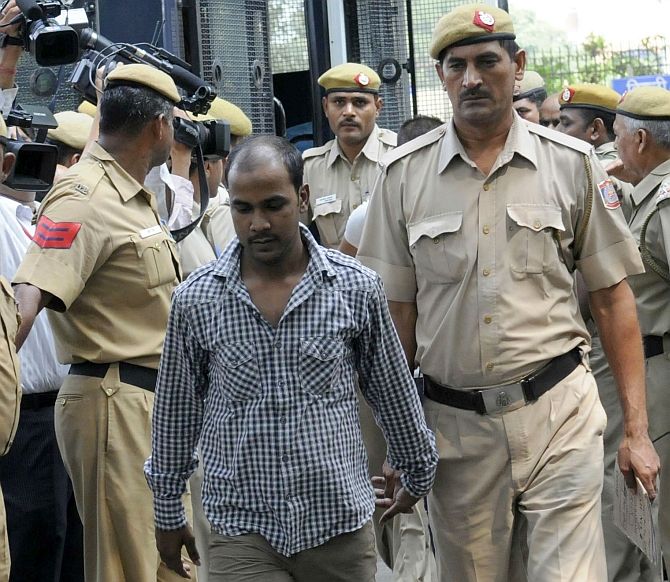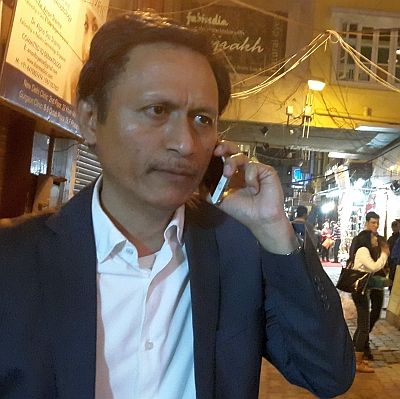'Whatever Mukesh Singh is saying, a lot of people say that in their normal conversations. I think that has alarmed them because they probably think that it is their voice in there!'
' The idea is to go into the mind of the rapist.' Dibang, co-producer of India's Daughter, defends the documentary in this exclusive interview to Sheela Bhatt/Rediff.com

Dibang made his mark as one of the best television anchors in the country before dabbling in many other things, including acting in a couple of films.
Dibang started his career at The Illustrated Weekly of India, then Asia's oldest magazine, and went on to work for several television networks (both in India and abroad). He has won many awards for his anchoring and documentaries.
His latest documentary, India's Daughter, which he co-produced with Leslee Udwin, is embroiled in a major controversy.
Based on the brutal December 16, 2012 gang-rape of a 23-year-old physiotherapy student, the controversial documentary includes an interview with Mukesh Singh -- one of the men convicted and sentenced to death for the crime -- who is lodged in Tihar jail in Delhi awaiting a Supreme Court hearing on his appeal.
For six long hours, Dibang interviewed Mukesh Singh who expressed no remorse for his crimes and suggested that his victim would not have been killed had she not fought back her attackers and behaved like 'decent girl.'
Dibang's interview has triggered a tsunami of angry protests, with the Indian government -- which does not seem to want the convict's mindset to be exposed to the world -- sending out advisories to international television stations, urging them not to screen the hard-hitting documentary that carries the ugly truth of gender inequality in India.
In an exclusive two-part interview with Sheela Bhatt/Rediff.com, Dibang narrates why every Indian must see his film and shares the agony of meeting Mukesh in Tihar jail.

Your film has become very controversial. Can you put your efforts in perspective? Why should this film be shown and not banned?
I think it deals with a very complex issue, which is very important for the world and for India today.
It is about gender equality and the kind of treatment meted out to women all over the world. This film actually addresses all those issues.
One in three women in Canada are sexually assaulted but only six per cent go and report it. This information is there in the film. In places like United Kingdom, the records are worse.
This film talks about a very important issue and talks about it from different angles.
That is why it should be shown and why it should be seen.
And, at its heart, is the December 16 Delhi gang-rape. Something unique and unprecedented happened then, in the sense that thousands of young people came out on the streets.
When it happened, I received calls from all over the world. That is where it touched a chord somewhere. Everybody identified with it. And these people who came out to India Gate -- most of them were young people -- they did not belong to any organisation or political party.
One of the problems the government had then was that they did not know who was leading the protesters. It was spontaneous anger that was coming out. The feeling that 'enough is enough' had emerged.
It (the film) is a salutation to all those young people. It understands the issue and tries to go into the mindset of a rapist.
This aspect is very important because unless you know how these (criminals) people think and who they are, how do you change them? How do you make sure that these things do not happen again?
In a country like ours, where millions of people are almost ignorant or in the agrarian age, there are millions of others in the industrial age. When they all come together there are a lot of divergent views, a lot of friction and serious debate as well.
This film tries to capture it.
It is alleged that the producers misled the authorities; nobody really thought that the interview would be packaged as a programme and shown on television.
Another allegation is about sensationalism almost touching voyeurism in the making of the film. Don't you think there is an element of sensationalism in Mukesh Singh's interview?
I think it is unfortunate that there is so much focus on what Mukesh had to say. Many people think that the entire film is about Mukesh. If you look at what he says it could look very sensational. But it is simply a part of the 62-minute film.
Whatever Mukesh Singh is saying, a lot of people say that in their normal conversations. I think that has alarmed them because they probably think that it is their voice in there! The idea is to go into the mind of the rapist.
When this controversy began, I was asked why we gave a platform to a rapist. It is not a question of giving a platform.
As a journalist, you have to talk to different sides. Ultimately, how you balance it, how much you play with one... that is your judgment and that decides whether it is a sensational story or a story which is trying to go deeper.
I interviewed this guy (Mukesh) for six hours. When you talk to somebody for six hours you know what happens.
When you talk to someone for five minutes it is different. When you talk to someone for a longer time, say 45 minutes or an hour, you get the complete picture. But when you talk to someone for six hours it is a deeper story.
I still remember, I was with him face to face and I was hallucinating because his face was looking distorted.
I was narrating this to an actor friend who told me that this was part of an exercise which actors do where they just stare at each other for two to three hours and faces start distorting. And I have experienced this.
What is your understanding of this man's psyche? We have only read selected portions. Who is Mukesh?
He comes from a small place -- and this is used in the film -- where he saw women only in a veil. He never saw them coming out of their houses alone. There was always a male member accompanying them. And after evenings, they did not come out of their house.
When he came to the city, he saw all these women in shopping malls, bars and discos. He saw women roaming around freely, as they do in any big city, wearing the kind of clothes he could only dreams of or imagine or see in films.
So, for him, these women actually walked out of the cinema screen. And that is when he feels what he did was wrong.
I think the a more serious part which needs to be debated is how to make these people -- who have come out -- to believe that what they are doing is not the way they should behave in a civil society.
This is not the way to behave with anybody, forget about women. So, do we have any programme from any of the governments? No!
Are we doing anything for these young people? No!
We have different worlds living together. When these different world churn in a big city, these things happen. And it is not just here. It happens in a lot of big cities all over the world, particularly in the developing countries.
In this case, Mukesh came from a rural background to the city and for him this had shock value. But city-born people commit rapes as well.
Also, some people argue that Mukesh is not and cannot be the representative of Indian men; his profile cannot depict Indian men's psyche in general.
These comments are partly due to the fact that people have not seen the documentary. It is saddening.
As an anchor, I always used to say that we should not ban books or prohibit film releases. Now, I am at the receiving end of it.
Even well-meaning and very liberal people, who are talking about the film, have not seen it. It is unfair to speak about it without seeing it.
If liberal people say that Mukesh produces stereotypes based on media reports, they should know that we have interviewed senior advocate Gopal Subramaniam, who was on the Justice Verma committee.
We have interviewed Amod Kanth, who works with juvenile criminals. We have interviewed the convicts's lawyers as well. The film doesn't only show the man who is hated. There are other issues.
Part II of the exclusive interview: 'If the victim's mother has no problem, why do people have an issue?'
VOTE: Should the Delhi gang-rape documentary be aired?
Images: Top: Mukesh Singh, the rapist featured in the documentary India's Daughter, being taken to court.
Dibang, the documentary's co-producer.











 © 2025
© 2025